Athletes and fitness fans know that nutrition is key for recovery.Eating right after working out can greatly help an athlete heal and get ready for more training.
At Riverside Sports Therapy, we get how food affects recovery. Our team has created detailed plans to help athletes eat better. This way, they can fix muscles faster and perform better.
Good nutrition after a workout is more than just eating calories. It’s abouteating the right foods to fix muscles, lower inflammation, and refill energy. Both pros and weekend athletes can learn from these important nutrition tips.
Key Takeaways
- Nutrition is essential for sports recovery and performance
- Proper nutrient timing is key for muscle repair
- Different athletes need unique recovery nutrition plans
- Post-workout nutrition affects muscle growth and reduces inflammation
- Getting expert advice can improve recovery nutrition plans
For personalized sports recovery nutrition advice, call Riverside Sports Therapy at (403) 283-7551.
Understanding the Basics of Sports Recovery Nutrition

Nutrition for sports recovery is key for athletes. It’s not just about eating. Athletes need a plan to refill energy, fix muscles, and get ready for more training.
Essential Components of Recovery Nutrition
Creating a recovery meal plan is all about knowing what you need. The main parts for good recovery are:
- Protein for muscle repair
- Carbohydrates for glycogen restoration
- Electrolytes for hydration balance
- Micronutrients for cellular recovery
The Recovery Timeline
Athletes need to know when to eat for recovery. The body reacts to food in different ways at different times:
- Immediate post-exercise (0-30 minutes): Important for quick nutrient uptake
- Short-term recovery (30 minutes – 2 hours): Keeps nutrients flowing in
- Long-term recovery (2-24 hours): Helps with full muscle repair and glycogen refilling
Impact on Athletic Performance
Good recovery meal planning helps athletes perform better. The right foods can lessen soreness, speed up healing, and help with training.
“Nutrition is the foundation of recovery and performance” – Sports Nutrition Experts
By using the right nutrition, athletes can recover better and stay in top shape for training.
Essential Macronutrients for Optimal Recovery
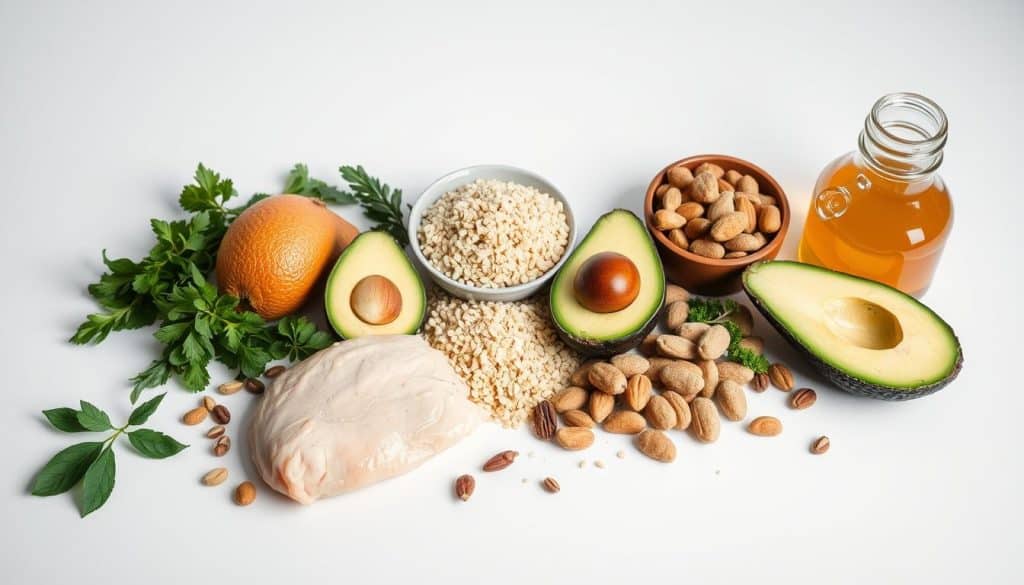
Athletes know that the right foods are key for healing after workouts. The three main nutrients – proteins, carbohydrates, and fats – are vital for recovery.
Protein is essential for fixing and growing muscles. Lean proteins help repair muscle damage from hard training. Athletes should eat high-quality proteins like:
- Chicken breast
- Greek yogurt
- Salmon
- Eggs
- Plant-based proteins like quinoa and lentils
Carbohydrates are also important for muscle energy. After hard exercise, muscles need quick energy. Complex carbs give lasting energy and help refill glycogen stores.
“Nutrition is the foundation of recovery. What you eat determines how quickly your body rebounds from intense physical activity.” – Sports Nutrition Expert
Healthy fats help with recovery too. They reduce inflammation and support hormone production. Foods like avocados, nuts, and olive oil are good for muscle recovery.
It’s important to balance these nutrients well. Each athlete’s needs depend on their training, body type, and metabolism.
Nutrition for Sports Recovery: Timing and Strategy
Good nutrition for sports recovery is more than just eating after a workout. The right foods can greatly improve how well you perform, repair muscles, and recover. It’s all about timing and planning your meals well.
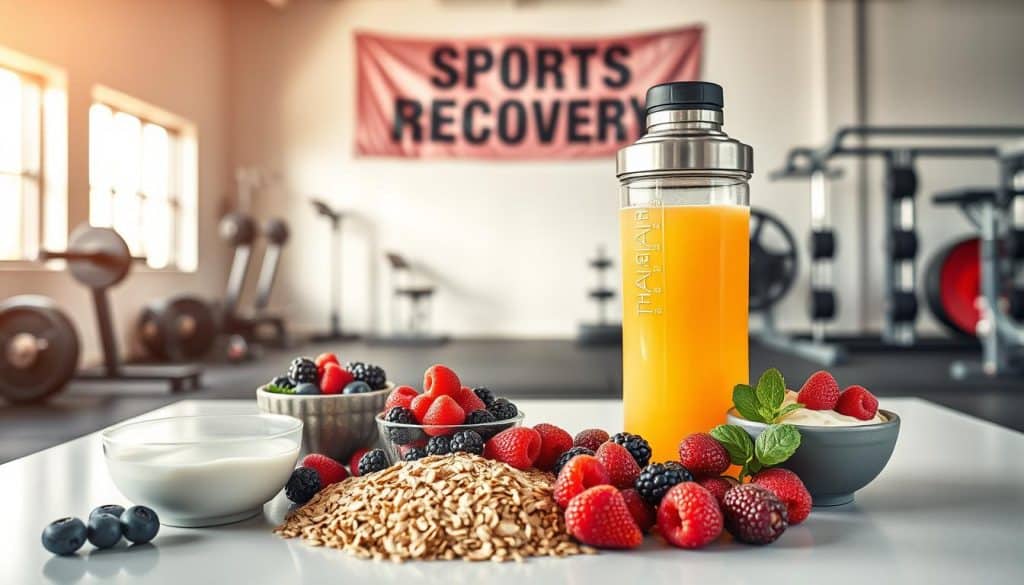
Athletes need to see recovery nutrition as a big process. It starts before and goes on after the workout. Knowing when to eat can help fix muscles and refill energy.
Pre-workout Nutritional Preparation
Getting ready for recovery starts before you even begin. Important steps include:
- Eating complex carbs 2-3 hours before you exercise
- Drinking enough water before you start
- Having a meal with lean proteins
Immediate Post-workout Window
The first 30 minutes after you exercise are key for recovery nutrition. This anabolic window is when your muscles take in nutrients best.
| Nutrient | Purpose | Recommended Intake |
|---|---|---|
| Protein | Muscle Repair | 20-25g |
| Carbohydrates | Glycogen Replenishment | 0.5-0.7g per pound of body weight |
| Electrolytes | Hydration Recovery | 500-750ml fluid |
Long-term Recovery Nutrition
Recovery meal planning is more than just the first 30 minutes. Athletes should aim for:
- Keeping protein intake steady all day
- Eating balanced meals with whole foods
- Staying hydrated
“Nutrition is the cornerstone of athletic performance and recovery” – Sports Nutrition Expert
Using a smart nutrition plan after workouts can really help. It can lessen muscle soreness and get you ready for more training.
Protein Requirements for Muscle Repair and Growth
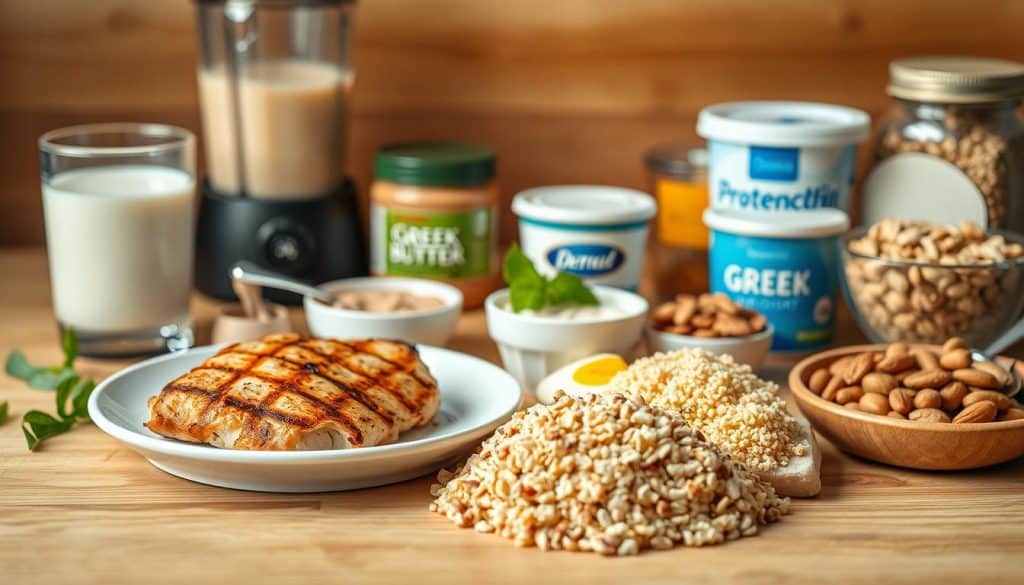
Protein is key for muscle recovery and sports performance. Athletes need the right amount of protein to fix and grow muscles. The body uses protein to mend muscle damage from hard workouts.
Different athletes need different amounts of protein. Foods rich in amino acids help start muscle repair.
- Strength athletes typically need 1.6-2.2 grams of protein per kilogram of body weight
- Endurance athletes require approximately 1.2-1.6 grams per kilogram
- Professional athletes may need up to 2.5 grams per kilogram during intensive training periods
“Protein is not just about quantity, but quality and timing,” says sports nutritionist Dr. Emily Rodriguez.
Here are some top protein sources for muscle recovery:
- Lean meats like chicken and turkey
- Fish such as salmon and tuna
- Greek yogurt
- Eggs
- Plant-based proteins like quinoa and legumes
Getting enough protein helps reduce soreness and speeds up recovery. Eating protein within 30 minutes after working out boosts muscle repair and growth.
Carbohydrate Loading and Glycogen Replenishment
Athletes need the right carbs to recover after hard workouts. Carbs help refill energy stores and fix muscles.
Muscle glycogen is key for top athletic performance. Athletes must eat carbs to refill glycogen stores after exercise.
Types of Carbohydrates for Recovery
- Simple Carbohydrates: Quick energy for fast recovery
- Complex Carbohydrates: Slow energy for longer recovery
- High Glycemic Index (GI) Carbs: Fastest glycogen refill
Optimal Carbohydrate Timing
| Recovery Phase | Carbohydrate Recommendation | Timing |
|---|---|---|
| Immediate Post-Exercise | 0.5-0.7 g per pound of body weight | Within 30 minutes |
| Extended Recovery | 1-1.2 g per pound of body weight | 2-4 hours after exercise |
Athletes should adjust carb intake based on their workout. The right carbs help restore glycogen and improve recovery.
Hydration Strategies for Enhanced Recovery
Drinking enough water is key for athletes to recover well and perform better. Many athletes don’t realize how important it is to replace lost electrolytes after working out. Drinking the right amount of water helps athletes regain energy, feel less tired, and heal faster.
Good hydration plans include several important steps:
- Monitor individual sweat rates
- Understand personal hydration needs
- Recognize dehydration warning signs
- Implement consistent fluid intake protocols
It’s very important to replace lost electrolytes after hard workouts. The body loses important minerals through sweat. These minerals need to be replaced to keep the body in balance.
| Hydration Stage | Fluid Intake Recommendation | Key Electrolytes |
|---|---|---|
| Pre-Exercise | 500-600 ml | Sodium, Potassium |
| During Exercise | 200-300 ml per hour | Magnesium, Chloride |
| Post-Exercise Recovery | 450-675 ml | Calcium, Phosphate |
Athletes should make their own hydration plans based on their workout intensity, the weather, and how their body reacts. Keeping track and making changes is essential for good hydration.
The Role of Electrolytes in Post-Exercise Recovery
Athletes know that getting back electrolytes is key for top performance and recovery. When they sweat a lot during hard workouts, they lose important minerals. This makes it vital to drink the right amount of water to recover well.
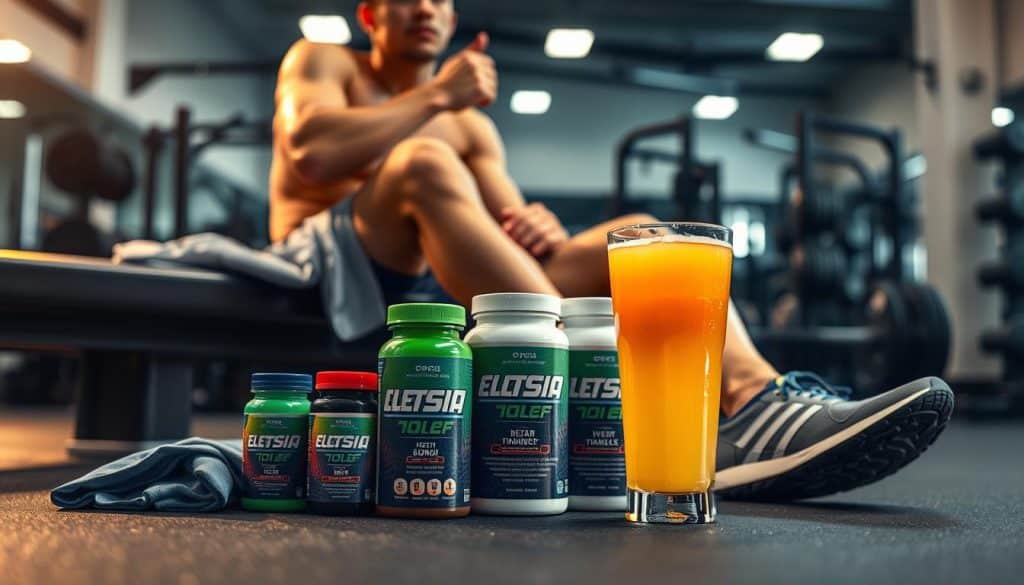
Electrolytes are essential for muscle function, nerve signals, and body balance. Athletes lose these minerals when they exercise hard. So, it’s important to replace them after working out.
Essential Electrolytes for Athletes
The body needs several key electrolytes to recover:
- Sodium: Helps with fluid balance and muscle contractions
- Potassium: Important for muscle and nerve health
- Magnesium: Helps muscles recover and prevents cramps
- Calcium: Supports muscle repair and bone health
- Chloride: Keeps acid-base balance right
Natural Sources vs. Supplements
Athletes have many ways to get back their electrolytes:
| Source Type | Pros | Cons |
|---|---|---|
| Natural Foods | Whole nutrients, extra vitamins | Slower absorption |
| Sports Drinks | Quick absorption, easy to use | Has added sugars, artificial stuff |
| Electrolyte Supplements | Right mix of minerals | Can be more expensive |
Getting the right hydration for recovery means knowing your nutritional needs. It’s about choosing the best electrolyte sources for you.
Anti-inflammatory Foods for Faster Recovery
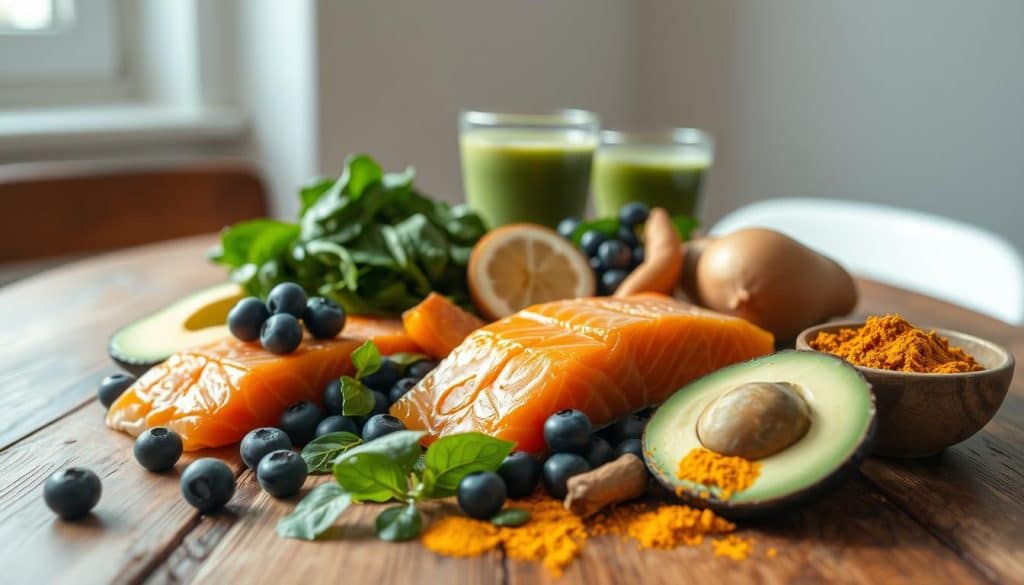
Athletes understand the importance of muscle recovery for their performance. Anti-inflammatory foods are key in helping the body heal and reduce inflammation from exercise. Knowing which foods help minimize damage and speed up healing is essential for top athletic performance.
Inflammation is the body’s natural response to physical stress. While some inflammation helps repair muscles, too much can slow recovery and hurt performance. The right nutrition can help balance this.
- Berries: Packed with antioxidants that reduce muscle inflammation
- Fatty fish: Rich in omega-3 fatty acids that combat inflammatory responses
- Turmeric: Contains curcumin, a powerful anti-inflammatory compound
- Leafy green vegetables: Provide essential nutrients that support muscle recovery
- Nuts and seeds: Offer anti-inflammatory properties and protein
Professional athletes often add these anti-inflammatory foods to their diet. They do this to improve muscle recovery and lower the risk of injuries from training.
| Food | Anti-inflammatory Benefits | Recommended Serving |
|---|---|---|
| Salmon | High omega-3 content | 3-4 oz, 2-3 times weekly |
| Blueberries | Powerful antioxidant properties | 1 cup daily |
| Turmeric | Reduces muscle soreness | 1/2-1 tsp daily |
| Spinach | Nutrient-dense recovery support | 1-2 cups daily |
Athletes looking to recover best should see nutrition as a strategic tool. By choosing the right anti-inflammatory foods, they can support their body’s healing and stay at their best.
Supplements That Support Athletic Recovery
Nutrition for sports recovery goes beyond just whole foods. Supplements play a big role in helping athletes perform better and heal faster. Athletes look for supplements that help fix muscles, lower inflammation, and speed up recovery.
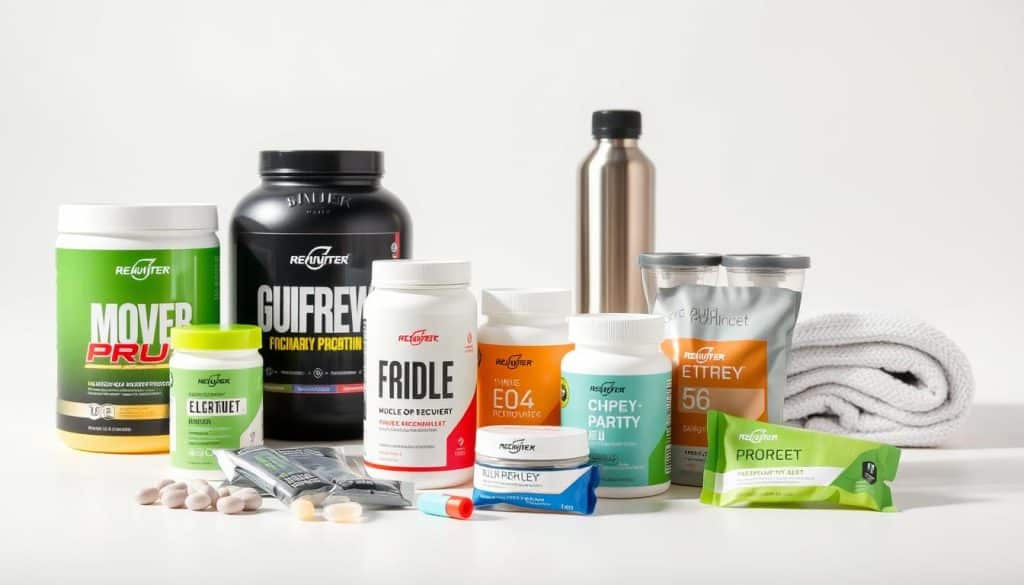
Sports recovery supplements give athletes proven ways to boost their nutrition. The right supplements can fill nutritional gaps and help the body recover naturally.
Evidence-Based Supplement Options
Here are some key supplements that can really help athletes:
- Creatine monohydrate for muscle regeneration
- Whey protein for quick muscle repair
- Branched-chain amino acids (BCAAs) for keeping muscles strong
- Omega-3 fatty acids for fighting inflammation from exercise
Safety and Dosage Guidelines
Choosing the right sports recovery supplements is important. You need to think about your own needs and how they might interact with other things you take.
| Supplement | Recommended Dosage | Primary Benefit |
|---|---|---|
| Creatine | 5g daily | Muscle strength recovery |
| Whey Protein | 20-25g post-workout | Muscle protein repair |
| Omega-3 | 1-2g daily | Anti-inflammatory support |
“Supplements should complement, not replace, a balanced nutritional approach.” – Sports Nutrition Research Institute
Always talk to a healthcare professional before starting any new supplements. This ensures they are safe and work well for you.
Meal Planning for Different Training Intensities
When athletes train at different levels, meal planning is key. It’s not the same for everyone. Each workout needs a special diet to fix muscles and refill energy.
Athletes need to tailor their meals to three main training levels:
- Light Training Days: Lower calorie intake with balanced macronutrients
- Moderate Training Days: Increased protein and carbohydrate consumption
- High-Intensity Training Days: Maximum nutrient density and caloric support
On light training days, keep calorie intake balanced. Eat lean proteins, complex carbs, and essential vitamins. Stick to moderate portions to avoid too many calories.
For moderate training, meals need more energy. Increase protein to 1.6-2.2 grams per kilogram of body weight. Also, eat more carbs to refill glycogen, which is key for lasting performance.
High-intensity workouts need careful nutrition. Aim for 20-25 grams of protein per meal. Add foods like quinoa, sweet potatoes, and lean meats to help muscles heal and energy come back.
“Nutrition is the cornerstone of athletic recovery. Understanding your body’s unique needs transforms performance.” – Sports Nutrition Expert
Recovery Nutrition for Endurance vs. Strength Athletes
Nutrition for sports recovery changes a lot between endurance and strength athletes. Each group needs special foods and nutrition plans to meet their training needs.
Athletes in different sports face different nutrition challenges when recovering. The body reacts differently to intense training, making personalized nutrition key for muscle repair and energy refilling.
Endurance-Specific Recovery Needs
Endurance athletes, like marathon runners and cyclists, need specific nutrition to recover. They focus on:
- More carbs to refill glycogen
- Less protein than strength athletes
- Drinking more water
Power Sport Nutritional Considerations
Strength and power athletes, like weightlifters and sprinters, need a different nutrition plan. They focus on protein for muscle repair.
| Athlete Type | Protein Needs | Carbohydrate Focus | Recovery Priority |
|---|---|---|---|
| Endurance Athletes | 1.2-1.4 g/kg body weight | High glycogen replenishment | Energy restoration |
| Strength Athletes | 1.6-2.2 g/kg body weight | Moderate carbohydrate intake | Muscle protein synthesis |
Nutrition for sports recovery is not the same for everyone. Knowing your body’s needs and training goals helps you find the right nutrition for top performance and recovery.
Common Nutritional Mistakes in Recovery
Athletes often overlook the importance of nutrition after workouts. This can greatly affect their performance and recovery. Knowing and avoiding these mistakes can lead to better results.
Planning your post-workout nutrition is key. Many athletes make big errors that hurt their recovery and performance.
- Skipping post-workout meals entirely
- Consuming insufficient protein for muscle repair
- Neglecting hydration after intense training
- Relying excessively on processed supplements
When you eat after working out matters a lot. Athletes should eat nutrients within 30-45 minutes after exercise. This helps repair muscles and refill energy stores.
| Mistake | Performance Impact | Recommended Solution |
|---|---|---|
| Undereating | Muscle breakdown | Calculate precise caloric needs |
| Poor Hydration | Reduced recovery speed | Drink electrolyte-balanced fluids |
| Supplement Overreliance | Nutrient imbalance | Prioritize whole food sources |
Good recovery meal planning means balanced nutrients and tailored strategies. Professional athletes know nutrition needs to be tailored to each person. It’s not a one-size-fits-all approach.
Creating a Personalized Recovery Nutrition Plan
Creating a personalized recovery meal plan is key for athletes. Each athlete’s body reacts differently to training and food. So, a plan made just for them is vital for the best performance.
To make a good recovery nutrition plan, follow these steps:
- Know your fitness goals
- Learn what your sport needs nutrition-wise
- Check your body’s current shape
- Keep track of how hard and often you train
Knowing your unique metabolic needs is the start of good recovery nutrition. Athletes should know that a one-size-fits-all plan doesn’t work well.
“Nutrition is not about being perfect. It’s about eating food that makes you feel great.” – Adele Davis
Your recovery meal plan should focus on the right mix of nutrients. Protein is key for fixing muscles, and carbs are for refilling glycogen. Don’t forget about staying hydrated and keeping electrolytes balanced.
Here are some tips for making your nutrition plan work:
- Keep a food and performance journal
- Try different meal times and types
- Update your plan often
- Get advice from a sports nutritionist
Remember, recovery nutrition changes as you do. Your plan should grow with your training, body, and goals.
Optimizing Nutrition for Effective Sports Recovery: The Conclusion
Nutrition for sports recovery is key for athletes to perform well and stay healthy. Knowing how to eat after workouts helps the body fix and get ready for more training. It’s all about finding the right mix for each athlete’s needs and how hard they train.
It’s not just about eating calories. Athletes need to pick the right foods, eat at the right time, and listen to their body. Everyone, from pros to weekend runners, can improve with a plan that helps muscles heal and energy levels come back. Drinking enough water, keeping electrolytes balanced, and eating foods that fight inflammation are also important.
Riverside Sports Therapy is here to help athletes with their nutrition needs. Our team offers detailed nutrition plans and advice to help you recover and perform better. Call us at (403) 283-7551 to get started on your nutrition journey.
Good sports recovery nutrition is a journey that’s all about you. By following the tips in this article, athletes can reach their best, avoid injuries, and train at their highest level.
